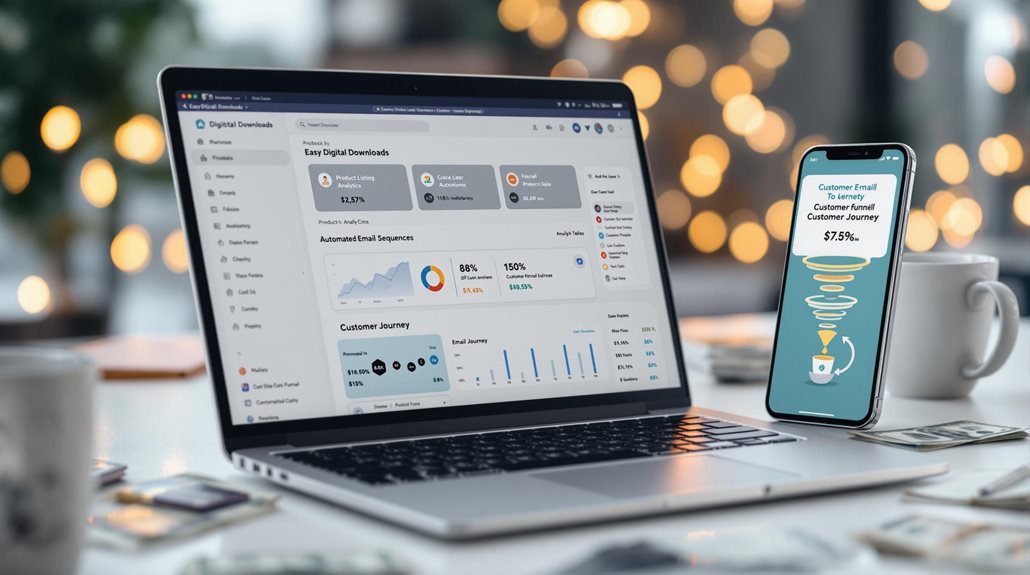Easy Digital Downloads Tutorial: Build Your WordPress Digital Product Empire – Selling digital products on WordPress using Easy Digital Downloads involves installing the plugin, configuring payment gateways like Stripe, and creating secure product listings with download restrictions.
The platform outperforms WooCommerce with 7.36% faster checkout speeds and native licensing features, requiring no additional plugins for digital product management.
Users must establish secure file organization, configure SSL certificates for payment protection, and implement access controls including download expiration times and IP restrictions to prevent unauthorized sharing.
This detailed guide explores advanced optimization strategies and cost-effective implementation approaches.
Key Takeaways
Hide- Install EDD plugin and run the automatic setup wizard to configure currency, payment gateways, email templates, and licensing systems.
- Create digital products with secure file organization, protected directories, and time-limited download links with IP restrictions for security.
- Configure payment gateways like Stripe for global support and set up tax automation including EU VAT compliance for legal adherence.
- Implement tiered pricing strategies with variable options (Basic, Premium, Enterprise) and bundle configurations to maximize revenue potential.
- Optimize content delivery using CDN services and file compression to reduce download times by 40-60% for better customer experience.
Why Easy Digital Downloads Beats WooCommerce for Digital Product Sales

When selecting e-commerce platforms for digital product sales, Easy Digital Downloads demonstrates clear technical and financial advantages over WooCommerce through measurable performance improvements and specialized functionality.
The platform’s streamlined architecture delivers faster loading times while requiring considerably fewer server resources, making it particularly suitable for businesses focused exclusively on digital merchandise.
Understanding these performance differences, cost structures, and use case scenarios enables entrepreneurs to make informed platform decisions that align with their specific business requirements and growth objectives.
Performance Advantages and Technical Superiority
Although WooCommerce dominates the general e-commerce landscape with over 28% market share, Easy Digital Downloads delivers measurably superior performance for digital product stores through its specialized architecture and streamlined codebase.
Performance benchmarks reveal EDD loads 7.36% faster than WooCommerce while utilizing only 2 scripts compared to WooCommerce’s 8+ scripts during checkout processes.
EDD’s digital licensing system operates natively without requiring additional plugins, while WooCommerce demands multiple extensions for equivalent functionality.
Security protocols in EDD automatically generate time-limited download links and protected file directories, eliminating common vulnerabilities associated with direct file access.
Plugin compatibility remains superior due to EDD’s focused scope, reducing conflicts that plague WooCommerce installations.
Update routines process more efficiently, maintaining store stability during version transitions while preserving custom configurations and customer access permissions.
Pricing Comparison: EDD vs WooCommerce Extension Costs
Digital product licensing features alone justify the investment differential. Essential WooCommerce extensions required for comparable functionality include:
- Software licensing plugins ($199) plus download security extensions ($149) for file management protection
- Customer access control systems ($179) combined with advanced sales analytics tools ($299)
- Subscription management ($199) paired with marketplace functionality ($399) for all-encompassing operations
EDD eliminates extension hunting by bundling customer access controls, file management security, and sales analytics within unified licensing.
WooCommerce forces businesses to research, purchase, and integrate multiple plugins separately, creating compatibility risks while multiplying annual renewal costs exponentially.
When to Choose EDD Over Other E-commerce Solutions
Business model alignment determines the most suitable e-commerce platform choice more than feature comparisons or pricing calculations alone.
EDD excels when digital product licensing requires sophisticated management, software updates need automation, or subscription-based delivery models dominate revenue streams.
The platform’s specialized architecture delivers superior hosting performance for concurrent downloads while maintaining payment security through native file protection systems.
WooCommerce suits businesses mixing physical inventory with digital offerings, requiring extensive customization, or needing broader payment gateway selection.
However, EDD’s extension bundles provide better value for digital-focused operations, while built-in tax compliance features handle complex VAT requirements across multiple jurisdictions.
Software vendors, course creators, and digital content marketers benefit most from EDD’s targeted functionality, whereas general retailers should consider WooCommerce’s broader ecosystem and marketplace presence.
Setting Up Your WordPress Foundation for Digital Product Success

Creating a successful digital product store requires establishing robust technical infrastructure before installing Easy Digital Downloads.
The hosting environment must support EDD’s specific requirements while delivering consistent performance during traffic spikes and concurrent file downloads.
Additionally, implementing proper content delivery networks, security certificates, and global file distribution systems guarantees customers worldwide experience fast, secure access to purchased digital products.
WordPress Hosting Requirements for EDD Stores
The technical foundation of an EDD store begins with meeting specific server requirements that exceed standard WordPress installations.
Modern EDD implementations require PHP 8.1 or higher, MySQL 8.0+, and WordPress 6.2+ to guarantee peak performance and security for digital product transactions.
Hosting decisions between shared, VPS, and managed WordPress solutions directly impact store scalability, download speeds, and the ability to handle concurrent customer transactions during peak sales periods.
PHP, MySQL, and WordPress Version Requirements
Modern EDD installations demand specific server environment configurations that differ substantially from standard WordPress requirements.
Current EDD 3.4+ necessitates PHP 8.1+ for digital product licensing security, MySQL 8.0+ for enhanced database performance, and WordPress 6.2+ for core compatibility.
- PHP security extensions enable encrypted license validation and secure download token generation
- MySQL backups maintain transaction integrity during WordPress updates and server optimization cycles
- Server optimization configurations support concurrent digital product downloads without performance degradation
Shared vs VPS vs Managed WordPress Hosting Options
Although shared hosting appears cost-effective for new digital product stores, the infrastructure limitations create significant bottlenecks that directly impact customer experience and revenue potential.
Shared hosting environments typically allocate 1-2 GB RAM and limited CPU resources among hundreds of websites, causing performance degradation during traffic spikes or when customers download large files simultaneously.
VPS hosting provides dedicated resources essential for digital licensing systems, file security protocols, and payment integration reliability.
Meanwhile, managed WordPress hosting delivers optimized performance with automated tax automation features and hosting scalability designed specifically for growing digital businesses.
SiteGround EDD Partnership and Specialized Hosting Solutions
SiteGround’s official partnership with Easy Digital Downloads establishes a hosting environment specifically engineered for digital product businesses, offering pre-configured EDD installations, optimized server settings, and specialized support teams trained in e-commerce troubleshooting.
Starting at $2.99/month for the first year, SiteGround’s EDD hosting includes the Vendd marketplace theme, essential EDD extensions, and automatic plugin updates that eliminate common compatibility issues plaguing self-managed installations.
The specialized hosting infrastructure addresses critical digital licensing requirements through enhanced security measures and plugin compatibility testing:
- Pre-configured SSL certificates and firewall rules protect customer payment data and file downloads while ensuring tax compliance reporting functions operate without interference
- Optimized database configurations accelerate hosting performance for license key generation, customer account management, and real-time download tracking across multiple concurrent transactions
- Automated backup systems safeguard product files, customer databases, and transaction records with one-click restoration capabilities that minimize business disruption during technical emergencies
CDN Integration and Global File Delivery Setup
Why do customers abandon downloads halfway through when files exceed 100MB without proper content delivery optimization?
CDN integration transforms EDD stores from local operations into global digital product distributorships, reducing download times by 40-60% while eliminating the bandwidth costs that destroy profit margins on large file deliveries.
Amazon CloudFront and MaxCDN offer specialized digital rights protection through signed URLs that expire automatically, preventing unauthorized sharing while maintaining access restrictions for legitimate customers.
File compression techniques reduce software packages by 30-70% without quality loss, while version control systems ensure customers receive the latest updates through cached edge servers worldwide.
Cloud storage integration with S3 or DigitalOcean Spaces eliminates server storage limitations, enabling unlimited product catalogs.
Also read: How to Install WordPress on DigitalOcean
Geographic distribution servers deliver content from locations nearest to customers, transforming global sales from technical challenges into competitive advantages.
SSL Certificate Implementation and Security Basics
SSL certificates form the non-negotiable security foundation for any EDD store handling customer payment data and personal information.
Modern encryption protocols protect sensitive transactions through 256-bit SSL encryption, creating secure connections between browsers and servers.
Server security extends beyond basic certificates to include malware prevention systems and holistic data privacy safeguards.
Essential SSL implementation requirements include:
- Certificate Authority validation from trusted providers like Let’s Encrypt, Cloudflare, or commercial SSL vendors
- HTTPS enforcement across all store pages, redirecting HTTP traffic automatically to encrypted connections
- Mixed content elimination ensuring all resources load securely without browser warnings or blocked elements
Payment processors require valid SSL certificates for compliance, while search engines prioritize HTTPS sites in rankings.
Free certificates through hosting providers offer adequate protection for most EDD stores, though extended validation certificates provide additional trust indicators for high-value transactions.
Installing and Configuring Easy Digital Downloads

Installing Easy Digital Downloads transforms a standard WordPress site into a specialized digital commerce platform through a systematic configuration process.
The plugin’s three-tier licensing structure—Personal ($99.50), Professional ($299.50), and All Access ($499.50)—determines available features, with higher tiers revealing advanced payment gateways, software licensing capabilities, and marketplace functionality essential for scaling digital businesses.
Proper initial configuration encompasses core store settings, payment processor integration, and tax compliance frameworks that establish the operational foundation for secure digital product transactions.
EDD Plugin Installation and Initial Setup Process
How smoothly your EDD installation proceeds depends entirely on completing the prerequisite technical requirements before beginning the actual plugin setup process.
Navigate to WordPress admin dashboard, select Plugins > Add New, then search “Easy Digital Downloads” and click Install Now followed by Activate.
The setup wizard automatically launches, guiding administrators through essential configuration steps including currency selection, payment gateway integration, and email notification templates.
- Store operators configure licensing management systems for software products requiring automatic updates and validation
- Digital product marketing campaigns integrate seamlessly with customer onboarding workflows through automated email sequences
- Subscription upgrades and promotional campaigns utilize built-in discount codes with percentage or fixed-amount pricing
Initial configuration establishes the foundation for sophisticated e-commerce operations, enabling advanced features like variable pricing, file access controls, and thorough sales reporting systems.
License Tier Selection: Personal vs Professional vs All Access
While the free EDD plugin provides basic digital product selling capabilities, understanding the distinct advantages of each license tier proves essential for matching business requirements with platform functionality.
The Personal Pass ($99.50 first year, $199 renewal) includes essential payment gateways, email marketing integration, and basic reporting features suitable for starting entrepreneurs.
Professional Pass ($299.50 first year, $599 renewal) adds software licensing capabilities, recurring payments for subscriptions, and advanced customer management tools that support growing digital businesses.
The All Access Pass ($499.50 annually) provides extensive functionality including marketplace features, commission tracking, and premium support access.
License management becomes increasingly sophisticated across tiers, with upgrade options available when business needs expand beyond current tier limitations, making tier comparison vital for long-term pricing strategy development.
Core Settings Configuration for Digital Product Sales
EDD configuration begins immediately after plugin installation with critical settings that determine store functionality, payment processing, and customer experience throughout the entire sales process.
The General Settings tab establishes foundational elements including currency selection, default gateway preferences, and purchase confirmation pages that directly impact conversion rates and customer satisfaction.
Essential configuration areas require immediate attention for excellent performance:
- Payment Gateway Setup – Configure Stripe or PayPal with proper API credentials and webhook endpoints
- Email Template Customization – Design purchase receipts and download notifications that reinforce brand identity
- Download Security Settings – Establish file protection limits, expiration periods, and IP restrictions for content protection
Advanced settings enable pricing enhancement through discount codes, customer segmentation via purchase history tracking, and email automation integration with marketing platforms.
User onboarding improves through customized account pages, while affiliate programs expand reach through commission-based partnerships that drive sustainable growth.
Payment Gateway Setup and Tax Configuration
Successful digital product transactions depend entirely on properly configured payment gateways and accurate tax calculations that comply with local regulations.
Stripe integration offers the most all-encompassing solution for EDD stores, supporting global payment options across 135+ currencies with built-in fraud protection and one-click setup via OAuth authentication.
Digital licensing requirements necessitate secure payment processing that maintains customer account management records for audit compliance and automated license key distribution.
Tax automation becomes critical when selling internationally, particularly for EU VAT compliance which requires location evidence retention for ten years.
Configure Stripe’s automatic tax calculation features to handle complex jurisdictional requirements while maintaining secure file hosting access tied to successful payment verification.
Payment gateway selection impacts both transaction fees and available features like Apple Pay, Google Pay, and subscription billing for recurring digital products.
Choosing the Right Extensions and Themes for Your Store

Selecting the most effective combination of EDD extensions and themes requires careful evaluation of bundle pricing versus individual purchases, as the cost differences can considerably impact long-term profitability.
The Personal Pass at $99.50 annually provides basic functionality, while the Professional Pass at $299.50 includes advanced features like software licensing that individual purchases would cost $400+ separately.
Theme selection must prioritize EDD-specific optimization over visual appeal, since lightweight, specialized themes like Themedd outperform bloated multipurpose alternatives that can conflict with extension functionality.
Extension Bundles vs Individual Purchases Strategy
When building an EDD store, merchants must evaluate whether purchasing extension bundles or individual components better serves their specific business model and feature requirements.
Three extensions consistently prove essential across different digital product categories: the Software Licensing extension enables automated license key generation and customer management for software vendors, Frontend Submissions transforms single-vendor stores into multi-vendor marketplaces where creators can list their own products, and Recurring Payments provides the subscription billing infrastructure necessary for membership sites, courses, and SaaS products.
The decision between bundled packages and individual purchases depends on how many of these core extensions align with the store’s immediate operational needs and long-term growth strategy.
Software Licensing Extension for License Key Management
The Software Licensing extension transforms EDD into a all-encompassing platform for software vendors, developers, and SaaS businesses requiring automated license key generation, remote activation validation, and automatic update delivery systems.
This powerful extension manages digital rights through extensive license tracking capabilities, enabling precise license restrictions and streamlined license renewal processes that protect intellectual property while maximizing revenue.
- License activation systems validate customer credentials remotely across multiple devices and installations
- Automated renewal notifications maintain continuous revenue streams through subscription-based licensing models
- Advanced tracking dashboards monitor license usage patterns and identify unauthorized distribution attempts
Frontend Submissions for Marketplace Functionality
Frontend Submissions extension enables marketplace transformation by allowing multiple vendors to upload and sell their digital products directly through a single WordPress installation.
This creates revenue-sharing opportunities similar to established platforms like Codecanyon or Etsy.
This functionality supports digital product licensing workflows, automated file security protocols, streamlined customer access management, all-encompassing version control systems, and strategic upsell strategies across multiple vendor storefronts within unified marketplace environments.
Recurring Payments for Subscription-Based Products
Recurring Payments extension transforms one-time digital product sales into predictable subscription revenue streams****,
enabling businesses to charge customers automatically on weekly, monthly, or annual cycles for continued access to software updates, premium content, or membership communities.
Digital licensing integrates seamlessly with subscription management,
while download analytics provide customer segmentation insights for automated billing optimization:
- Monthly software maintenance subscriptions with automatic license renewals
- Annual premium content memberships with tiered access levels
- Weekly coaching programs with progressive content delivery
EDD-Optimized Theme Selection and Customization
Theme selection fundamentally determines how effectively an EDD store converts visitors into customers, with specialized themes offering superior integration compared to generic WordPress options.
The choice between Themedd’s free official optimization and premium alternatives like Olam directly impacts checkout functionality, product display capabilities, and overall user experience.
Mobile responsiveness becomes critical as digital product buyers increasingly complete purchases on smartphones, requiring themes that maintain full functionality across all device sizes while supporting modern payment methods like Apple Pay and Google Pay.
Free Themedd vs Premium Theme Options
EDD store owners face a fundamental design decision that directly impacts both functionality and long-term costs when selecting their store’s visual foundation.
The free Themedd theme provides official EDD optimization with built-in digital product licensing support and robust file security strategies, while premium alternatives offer advanced customization.
- Customer access controls integrate seamlessly with native WordPress user management
- Download expiration policies configure automatically through theme-embedded shortcodes
- Variable pricing techniques display elegantly across responsive grid layouts
Mobile Optimization and Responsive Design Requirements
Mobile commerce dominates digital product purchasing patterns with 60% of EDD store traffic originating from smartphones and tablets.
This shift fundamentally reshapes how store owners must approach theme selection and checkout optimization.
Essential mobile responsiveness requires responsive layout frameworks, touch friendly design elements, mobile payment integration capabilities, and proper viewport settings that automatically adjust content display across varying screen dimensions.
Creating and Managing Your Digital Products

Successful digital product management begins with establishing secure file organization systems that protect intellectual property while ensuring seamless customer access.
The product creation process encompasses strategic file structuring, upload protocols, and security configurations that prevent unauthorized distribution while maintaining user-friendly download experiences.
Advanced promotional features, including variable pricing tiers and bundling strategies, transform basic product listings into sophisticated revenue-generating systems that maximize customer lifetime value.
Digital Product Organization and File Security Setup
The foundation of any profitable digital store begins with systematic product organization and bulletproof file security protocols.
Digital product licensing requires careful version control practices** that track updates, customer entitlements, and distribution rights across multiple file formats.
EDD automatically creates protected directories preventing unauthorized access, while cloud storage integration enables scalable delivery without overwhelming server resources.
File security strategies must address both technical protection and download bandwidth management to prevent account sharing and server crashes during peak sales periods. Smart merchants implement:
- Time-limited download links that expire after 24-48 hours to minimize redistribution risks
- IP address restrictions limiting downloads to specific geographic locations or user devices
- Automated backup systems storing product files across multiple cloud storage providers for redundancy
These foundational elements ensure sustainable growth while protecting valuable digital assets from unauthorized distribution.
Product Creation Workflow and File Upload Process
Product creation in EDD extends beyond simple file uploads to encompass sophisticated pricing strategies and access controls that protect digital assets while maximizing revenue potential.
Variable pricing structures allow store owners to offer multiple product tiers with different features.
Bundle configurations combine related products at discounted rates to increase average order values.
Download limits, expiration settings, and IP-based access restrictions work together to prevent unauthorized sharing while ensuring legitimate customers maintain reasonable access to their purchased digital products.
Variable Pricing and Bundle Product Configuration
- Basic tier offers core functionality with standard download limits for price-conscious customers.
- Premium tier includes advanced features, extended support, and increased download allowances.
- Enterprise tier provides unlimited access, priority support, and commercial licensing rights.
Download Limits and Expiration Settings
How effectively does download limit configuration prevent account sharing while maintaining customer satisfaction?
Strategic download limit settings in EDD serve as the primary defense against unauthorized distribution and account abuse, requiring careful balance between security measures and legitimate customer needs.
Download restrictions typically range from 3-10 attempts per purchase, while expiration management automatically revokes file access after predetermined periods.
License enforcement combines with download tracking to monitor suspicious activity patterns and prevent abuse.
Customer Access Controls and IP Restrictions
Advanced customer access controls in EDD extend beyond basic download limits to encompass sophisticated IP restriction systems that protect high-value digital products from unauthorized distribution networks.
- Digital Rights Management: Configure per-product IP blocking rules that prevent downloads from suspicious geographical locations or known proxy servers.
- User Authentication Layers: Implement two-factor authentication requirements for premium software downloads and enterprise license activations.
- Access Control Monitoring: Track download patterns across multiple IP addresses to identify potential account sharing violations.
Advanced Product Features and Promotional Strategies
Why do some digital product stores generate 300% higher conversion rates while others struggle with basic sales? The answer lies in implementing advanced promotional strategies that leverage EDD’s sophisticated feature set.
Digital product licensing creates recurring revenue through software updates and support subscriptions.
Variable pricing strategies enable tiered offerings where basic, premium, and enterprise versions target different customer segments effectively.
Secure file delivery builds trust through protected downloads with expiration dates and access limits.
Customer access controls prevent unauthorized sharing while marketplace integrations expand distribution channels through affiliate programs and multi-vendor functionality.
Smart store owners combine discount codes with seasonal promotions, limited-time offers, and bundle pricing to maximize average order values and customer lifetime value.
Payment Processing and Financial Management

Successful digital product sales depend on implementing secure, efficient payment processing systems that minimize transaction costs while maximizing customer conversion rates.
The choice between major payment gateways like Stripe, PayPal, and Square profoundly impacts both operational expenses and international market accessibility, with fee structures varying from 2.6% to 4.4% depending on transaction type and geographic location.
Understanding these financial implications, along with proper gateway configuration and currency support options, enables store owners to optimize their payment infrastructure for sustained profitability and global reach.
Stripe Integration Setup and Configuration
Stripe integration with Easy Digital Downloads requires methodical configuration across multiple system layers to guarantee secure payment processing and ideal customer experience.
The OAuth connection process establishes encrypted communication channels between WordPress and Stripe’s API, enabling real-time transaction processing with automatic fraud detection through Stripe Radar’s machine learning algorithms.
Advanced configuration options support sophisticated business models including digital product licensing systems, automated license renewal workflows, and product versioning capabilities.
Download throttling prevents bandwidth abuse while file encryption protects intellectual property throughout the delivery process.
Essential configuration steps include:
- API key authentication linking live and test environments for seamless development transitions
- Webhook endpoint configuration ensuring transaction status synchronization and customer notification triggers
- Payment method enablement activating Apple Pay, Google Pay, and international currency processing for global reach
Payment Gateway Comparison: Stripe vs PayPal vs Square
How should digital product sellers evaluate payment gateway options when transaction fees, international capabilities, and integration complexity directly impact profit margins and customer conversion rates?
Payment gateway selection fundamentally determines both operational costs and customer experience quality, with each major provider offering distinct advantages that align with specific business models and geographic requirements.
Stripe excels in Digital Licensing environments with native EDD integration, supporting 135+ currencies and automated Tax Automation across 32 countries at 2.9% + $0.30 per transaction.
PayPal offers broader consumer recognition but charges 4.4% for international transactions, potentially reducing margins for global software sales.
Square provides competitive domestic rates at 2.6% + $0.10 but limits international reach.
Payment Integration complexity varies considerably: Stripe connects via one-click OAuth, while PayPal requires manual API configuration.
For File Security and Download Management, Stripe’s advanced fraud detection through Radar provides superior protection against unauthorized access attempts.
Transaction Fee Structure and Cost Optimization
Digital product businesses lose an average of 12-18% of gross revenue to payment processing fees, transaction costs, and platform charges, making fee optimization a fundamental profit protection strategy.
EDD’s transaction fee structure varies markedly based on license tier, with Free and Personal plans adding 3% surcharges that Extended Pass eliminates entirely.
Smart fee optimization requires strategic gateway selection and product bundling approaches that maximize average order values while minimizing per-transaction costs:
- Configure digital licensing tiers with higher-priced bundles to reduce percentage-based fee impact
- Implement download security measures that justify premium pricing and improved profit margins
- Utilize file encryption and license management systems to create recurring revenue streams
Advanced businesses leverage annual billing cycles and subscription models to reduce transaction frequency, while all-encompassing product bundling strategies increase cart values beyond break-even thresholds for sustainable profitability.
International Payment Processing and Currency Support
Stripe’s international infrastructure supports 135+ currencies with automatic localization, displaying prices in customers’ native currencies while handling real-time currency conversion at competitive rates.
Payment gateways like PayPal offer region-specific solutions including SEPA for Europe and Alipay for Asia, vital for building consumer trust through familiar payment methods.
Digital licensing revenue increases 40% when stores support local payment preferences, as customers abandon purchases when forced to use unfamiliar payment systems.
International taxes require automated calculation based on customer location, with EDD extensions handling VAT compliance across EU territories and provincial taxes throughout Canada.
Tax Compliance and Legal Requirements

Tax compliance for digital product sales extends far beyond simple payment processing, requiring careful configuration of state-specific rules and international regulations.
US businesses must navigate varying state tax requirements where digital products face different treatment, while EU operations demand VAT compliance regardless of business location.
Proper legal documentation including terms of service, privacy policies, and refund procedures forms the foundation for legitimate digital commerce operations.
US State Tax Configuration for Digital Products
Navigating US state taxation for digital products requires understanding a complex patchwork of regulations that varies considerably across all 50 states.
Digital licensing creates additional complexity as some states differentiate between downloadable software, streaming content, and subscription services.
Regional compliance demands careful attention to nexus laws, where selling above certain thresholds triggers registration requirements.
EDD’s tax configuration supports state-specific rates through its settings panel, enabling automated calculations based on customer location.
Product bundling strategies must account for varying tax treatments when combining digital and physical items. Customer segmentation by state helps identify high-volume regions requiring closer compliance monitoring.
Key compliance considerations include:
- Documentation requirements for audit purposes spanning multiple tax years
- Monthly sales threshold monitoring to identify new registration obligations
- Download security protocols ensuring tax-compliant delivery verification systems
Professional tax consultation becomes essential when approaching $100,000 in annual sales across multiple states.
EU VAT Compliance and Automated Tax Solutions
European Union VAT compliance presents complex challenges for digital product sellers, requiring businesses to collect VAT from all EU customers regardless of their own location.
The Easy Digital Downloads EU VAT extension automates rate calculation, customer location verification, and invoice generation while maintaining the required documentation for tax authorities.
Advanced tax management platforms like Quaderno integrate seamlessly with EDD to handle global tax compliance across multiple jurisdictions, automatically calculating rates, filing returns, and managing remittance schedules for businesses operating internationally.
Easy Digital Downloads EU VAT Plugin Setup
Since January 2015, digital product sales to EU consumers trigger mandatory VAT collection regardless of seller location, making compliance automation essential for WordPress store owners.
The EDD EU VAT extension transforms complex regulatory requirements into automated workflows, handling real-time VAT rate calculations across all 27 member states, maintaining legally required location evidence**, and generating quarterly reports for tax authorities.
- Regional tax automation calculates precise VAT rates for each member state while validating business VAT numbers through official EU databases
- Digital licensing compliance maintains customer location evidence through IP geolocation and billing address verification for required audit trails
- Product bundles taxation applies appropriate VAT rates to mixed-content purchases while handling complex cross-border transaction requirements
Quaderno Integration for Global Tax Management
Quaderno emerges as the all-encompassing tax automation solution that extends beyond EU VAT to handle global tax compliance across 100+ countries and jurisdictions.
The platform automatically calculates taxes for digital product licensing, maintains customer download security records, integrates with major file hosting strategies, supports software update mechanisms, and guarantees international tax compliance through real-time rate updates and automated invoice generation.
Legal Documentation Requirements
Digital product stores require extensive legal documentation that extends beyond basic e-commerce requirements, encompassing specialized terms for digital goods, licensing agreements, and data protection compliance.
Modern privacy regulations like GDPR and California’s AB 2426 mandate specific disclosures about data collection, customer rights, and automated decision-making processes that affect digital product recommendations and pricing.
These legal frameworks create overlapping compliance requirements that demand careful documentation strategies, particularly for businesses serving international customers or operating subscription-based digital services.
Terms of Service and Privacy Policy Creation
Legal documentation requirements for EDD stores extend beyond basic business compliance to address specific digital product regulations and data protection laws.
User agreements must specify download limits, refund policies, and intellectual property rights, while privacy policies require detailed data collection disclosures for user consent compliance.
- Terms clearly defining permitted usage and redistribution restrictions for digital products
- Privacy statements covering customer data processing, cookie usage, and third-party integrations
- Refund policies addressing defective downloads, compatibility issues, and satisfaction guarantees
GDPR Compliance and California AB 2426 Requirements
Modern data protection regulations impose specific obligations on WordPress EDD stores operating internationally, with GDPR affecting any business serving EU customers and California AB 2426 governing subscription transparency for California residents.
Digital licensing systems require explicit consent for data collection, secure license management protocols, automated data deletion capabilities, and clear subscription cancellation processes to maintain GDPR compliance while managing EU VAT obligations and security protocols.
Security Implementation and File Protection Systems

Digital product stores face unique security challenges that require coordinated protection across WordPress core, EDD-specific configurations, and server infrastructure.
Thorough security implementation begins with WordPress security plugins that monitor file integrity, while EDD’s native file protection systems create secure download links with time-based expiration and IP tracking.
Server-level configurations on NGINX and Apache platforms provide additional barriers against unauthorized access, complemented by automated backup systems that guarantee business continuity during security incidents or technical failures.
WordPress Security Plugin Integration
Security plugin selection for EDD stores requires balancing extensive protection with performance optimization to prevent conflicts with digital product delivery systems.
Wordfence provides real-time firewall protection and malware scanning with specific EDD compatibility, while Sucuri offers cloud-based security monitoring that reduces server load during high-traffic sales periods.
All-In-One WP Security delivers essential protection through a freemium model, though its basic features may prove insufficient for stores processing sensitive customer data and payment information.
Wordfence vs Sucuri vs All-In-One WP Security
WordPress security plugins become essential infrastructure components when protecting digital product stores that process thousands of downloads and handle sensitive customer data daily.
Three leading solutions offer distinct advantages for EDD implementations requiring robust file security and payment integration protection:
- Wordfence provides real-time malware scanning with specialized digital licensing protection
- Sucuri delivers cloud-based filtering optimized for hosting optimization environments
- All-In-One WP Security offers exhaustive tax compliance audit logging features
EDD File Protection and Download Security Configuration
File protection mechanisms in EDD create multiple security layers that prevent unauthorized access to digital products.
Download link obfuscation generates unique, cryptographically secure URLs that mask actual file locations from potential pirates.
The system implements file access restrictions through protected directories that block direct downloads, requiring customers to authenticate through WordPress before accessing content.
License validation occurs automatically when customers attempt downloads, verifying purchase status and remaining download allowances.
Expiration control enables time-limited access periods, typically 24-48 hours after link generation, preventing indefinite sharing of download URLs.
User role permissions integrate with WordPress capabilities, allowing granular control over who can access specific products or customer data.
Advanced configurations include IP address restrictions, download attempt logging, and automatic blacklisting of suspicious activity patterns for thorough digital asset protection.
Server-Level Security Setup for NGINX and Apache
Proper web server configuration forms the cornerstone of thorough digital product protection that extends beyond WordPress-level security measures. NGINX and Apache servers require specific directives to prevent unauthorized access to protected files, ensuring digital licensing systems maintain integrity throughout the download process.
NGINX configuration demands location blocks that deny direct file access while permitting EDD’s secure download handlers to function properly:
- Block direct access to
/wp-content/uploads/edd/directories containing sensitive files - Implement custom headers for file encryption verification and license validation checks
- Configure rate limiting to prevent automated download attempts that bypass product encryption
Apache servers utilize .htaccessrules within protected directories, creating barriers against direct URL access while maintaining download security protocols.
These server-level protections complement EDD’s built-in license verification system, creating multiple authentication layers that sophisticated attackers cannot easily circumvent through standard web requests.
Backup Systems and Disaster Recovery Planning
Comprehensive disaster recovery protocols become absolutely critical when digital product sales represent primary revenue streams that cannot tolerate extended downtime or data loss.
EDD stores require multi-layered backup strategies encompassing database snapshots, file repositories, and customer data protection to maintain business continuity during server failures or security breaches.
Automated daily backups through UpdraftPlus or BackWPup preserve product files, customer purchase histories, and digital rights configurations.
Critical components include license verification databases, encrypted product files, and customer onboarding sequences that must restore seamlessly.
Recovery testing validates backup integrity monthly, while geographically distributed storage prevents single-point failures.
Software updates trigger automatic backup creation before deployment, protecting against compatibility issues.
Cloud-based solutions like AWS S3 or Google Drive provide redundant storage, while staging environments enable safe testing of restored systems before production deployment.
Software Licensing and Advanced Product Management

Software vendors selling applications, plugins, or digital tools require sophisticated licensing systems that extend far beyond basic file downloads.
The EDD Software Licensing extension transforms WordPress stores into extensive license management platforms, generating unique activation keys, enforcing domain restrictions, and providing automated update delivery through secure API connections.
These advanced product management features enable software creators to protect intellectual property, control distribution, and maintain ongoing customer relationships through seamless update mechanisms that rival enterprise-level licensing solutions.
Software Licensing Extension Implementation
Digital product licensing enables sophisticated customer access controls through unique license keys that validate software installations and prevent unauthorized distribution.
The extension generates time-limited activation codes, tracks active installations across multiple sites, and enforces user limits for different pricing tiers.
Key implementation features include:
- Automatic update delivery that pushes new software versions directly to licensed installations without manual intervention
- Remote deactivation capabilities allowing instant license revocation for non-payment or policy violations
- Usage analytics dashboard providing real-time data on license activations, update downloads, and customer behavior patterns
Variable pricing strategies become possible through extension bundling, where premium licenses include additional features, extended support periods, and priority update access for scalable software businesses.
License Key Generation and Activation Systems
License key management operates through EDD’s Software Licensing extension, generating unique keys automatically upon purchase completion.
Activation protocols verify customer credentials against your database, enabling real-time license validation during software startup.
Domain restrictions limit activation to specified websites or applications, preventing unauthorized redistribution across multiple installations.
License renewal processes automate subscription billing while maintaining continuous software access for paying customers.
License analytics provide thorough tracking of activation attempts, geographic usage patterns, and renewal rates, enabling data-driven decisions about pricing strategies and customer behavior analysis for optimized revenue generation.
API Integration for Desktop Software Updates
The API workflow begins when software applications ping your WordPress server at predetermined intervals, transmitting license keys for validation against your digital licensing database.
Your EDD store responds with version information, download security tokens, and expiration controls that determine update eligibility.
Key integration components include:
- License management endpoints that verify customer subscriptions and product bundling permissions
- Secure download URLs with time-limited access tokens preventing unauthorized distribution
- Version control systems that track release histories and compatibility requirements
This automated infrastructure eliminates manual update distribution while maintaining strict licensing compliance.
Customer License Management and Domain Restrictions
How effectively can software vendors control unauthorized distribution while maintaining legitimate customer satisfaction?
EDD’s Software Licensing extension provides extensive Digital Licensing capabilities that balance security with user experience.
License Activation occurs through API calls that verify customer purchases against domain restrictions, preventing unauthorized installations while allowing legitimate transfers.
File Encryption protects software integrity through secure download links and checksum verification.
Access Restrictions enable vendors to limit installations per license, typically allowing 1-3 activations for single-user licenses.
The system supports automatic deactivation when customers exceed limits, plus manual override capabilities for legitimate use cases.
Version Control integration automatically notifies licensed users of updates through built-in API endpoints.
Advanced features include license expiration dates, upgrade path management, and real-time activation monitoring, ensuring sustainable software distribution models.
SEO Optimization and Mobile Performance

Digital product stores face unique SEO challenges that require specialized optimization strategies beyond traditional e-commerce approaches.
Mobile performance becomes critical when customers download large files through smartphones and tablets, demanding progressive web app features that maintain functionality across varying connection speeds.
Successful EDD stores implement schema markup for rich snippets while optimizing global content delivery networks to guarantee consistent download performance regardless of geographic location.
Digital Product SEO Strategy and Keyword Targeting
Digital branding succeeds through long-tail keywords targeting specific problems rather than generic product terms.
Content marketing builds authority by creating educational resources that demonstrate expertise before selling solutions.
Customer retention improves when product pages include exhaustive descriptions, tutorials, and use cases that answer searcher intent.
Effective digital product SEO focuses on three strategic pillars:
- Problem-solution keyword pairs that connect user pain points with immediate digital solutions
- Technical specification targeting for software products using version numbers, compatibility terms, and feature-specific phrases
- Comparison content optimization leveraging social proof and influencer outreach to capture competitive research queries
Schema Markup Implementation for Rich Snippets
Schema markup transforms digital product visibility by providing search engines with structured data that enables rich snippets, enhanced search results, and improved mobile performance metrics.
EDD stores benefit from Product schema implementation that displays pricing, availability, and customer ratings directly in search results, increasing click-through rates by 15-30%.
Essential schema types for digital licensing include SoftwareApplication markup for software products, Course markup for educational content, and Organization markup for business credibility.
Payment gateways like Stripe automatically generate transaction schema, while hosting optimization ensures fast schema parsing for mobile performance.
Tax compliance benefits from LocalBusinessschema displaying verified business information, building consumer trust.
File security considerations require avoiding sensitive data in public schema markup.
Implementation involves adding JSON-LD structured data to product pages through EDD schema extensions or manual coding.
Mobile Optimization and Progressive Web App Features
Progressive Web App technology revolutionizes how customers interact with EDD stores by delivering native app experiences through mobile browsers.
These features enable offline product browsing, push notifications for new releases, and one-tap checkout functionality that dramatically improves conversion rates on mobile devices.
Mobile optimization extends beyond responsive design to encompass all-encompassing marketing strategies that bridge digital and traditional channels:
- Offline marketing campaigns featuring QR codes that direct customers to mobile-optimized product pages
- Print advertising materials displaying shortened URLs optimized for mobile browser navigation
- Event sponsorships incorporating mobile-first landing pages for immediate product access
Direct mail campaigns benefit from mobile-optimized checkout flows, while telemarketing efforts direct prospects to simplified mobile purchasing experiences.
PWA implementation reduces page load times by 40% and increases mobile conversion rates by 15-25% compared to standard responsive designs.
Performance Optimization for Global Download Delivery
Global content delivery networks fundamentally transform how EDD stores serve digital products to customers worldwide, reducing download times from minutes to seconds regardless of geographic location.
CDN integration through Amazon CloudFront or MaxCDN distributes files across 200+ edge locations, eliminating bottlenecks during peak sales periods.
Digital Product Marketing strategies benefit from faster delivery speeds, improving Customer Engagement metrics and reducing cart abandonment rates.
Performance optimization extends beyond file delivery to encompass database optimization, image compression, and caching layers.
Email Campaigns promoting large downloads require reliable infrastructure to handle simultaneous access spikes.
Affiliate Partnerships depend on consistent download experiences to maintain conversion rates.
Content Strategy must account for global audiences accessing multi-gigabyte files across varying connection speeds, making CDN implementation essential for international market expansion.
Marketing Automation and Customer Lifecycle Management

Successful digital product businesses require automated systems that nurture customers from initial purchase through long-term engagement and repeat sales.
Email marketing platform integration transforms one-time buyers into loyal subscribers by delivering targeted content based on purchase history, download behavior, and engagement patterns.
Customer support system integration complements email automation by providing seamless ticket management, knowledge base access, and real-time assistance that reduces refund requests while increasing customer lifetime value.
Email Marketing Platform Integration
Email marketing automation transforms one-time EDD customers into recurring revenue through strategic platform integration and lifecycle management.
Popular platforms like MailChimp, ConvertKit, and AWeber connect directly with EDD to automatically segment customers based on purchase behavior, product preferences, and engagement patterns.
These automated sequences nurture prospects through educational content, deliver post-purchase support materials, and present targeted upsells that increase customer lifetime value.
MailChimp, ConvertKit, and AWeber Setup
Marketing automation platforms integrate seamlessly with EDD through native extensions that synchronize customer data, purchase behavior, and download activity across the entire sales funnel.
These integrations enable sophisticated customer onboarding sequences and upsell techniques that enhance your digital storefront’s conversion potential while supporting product diversification and consistent branding strategies.
- MailChimp synchronizes purchase data automatically, creating targeted segments based on product categories and customer lifetime value.
- ConvertKit triggers behavioral email sequences when customers download specific products or reach purchase milestones.
- AWeber enables advanced tagging systems that personalize follow-up campaigns according to individual customer purchase patterns.
Customer Segmentation and Automated Sequences
Customer segmentation in EDD stores transforms anonymous purchasers into distinct behavioral groups that respond to targeted messaging campaigns designed around purchase history, download frequency, and engagement patterns.
Automated sequences deliver personalized content based on customer journey stages, while behavioral targeting enables precise email personalization that increases conversion rates through strategic timing and relevant product recommendations.
Customer Support System Integration
Customer support systems determine post-purchase satisfaction and retention rates for digital product businesses.
Fluent Support provides WordPress-native helpdesk functionality with ticket management, customer history integration, and automated routing.
Help Scout Desk offers advanced features like collision detection, satisfaction surveys, and detailed reporting analytics.
Knowledge base creation through self-service portals reduces support ticket volume by 40-60% while empowering customers to resolve common issues independently through searchable documentation and video tutorials.
Fluent Support and Help Scout Desk Implementation
Professional support systems transform digital product businesses from basic sales operations into all-encompassing service ecosystems that retain customers and drive recurring revenue.
Fluent Support integrates directly with EDD customer data, while Help Scout provides advanced ticket routing and knowledge base functionality for complex digital licensing inquiries.
- License renewal notifications automatically trigger support workflows
- Product bundling complications require structured ticket categorization systems
- License analytics integration enables proactive customer outreach strategies
Knowledge Base and Self-Service Portal Creation
Why do 73% of customers attempt to resolve issues independently before contacting support, and how does this behavior reshape digital product businesses?
Self-service portals reduce support ticket volume by 40-60% while increasing customer satisfaction scores, as buyers prefer immediate access to solutions over waiting for human assistance.
Knowledge base systems integrated with EDD stores create extensive resource libraries that address common digital licensing questions, download problems, and product usage guides through searchable documentation covering file encryption protocols, download analytics interpretation, license renewal procedures, and product bundling configurations via step-by-step troubleshooting workflows.
Analytics and Performance Tracking

Analytics and performance tracking transform raw EDD transaction data into actionable business intelligence that drives revenue growth and operational efficiency.
Modern digital product stores require exhaustive measurement systems that connect customer behavior patterns with conversion metrics, enabling data-driven decisions about product pricing, marketing campaigns, and user experience optimization.
Successful EDD implementation depends on establishing proper Google Analytics 4 e-commerce tracking, integrating WordPress dashboard analytics through specialized plugins, and creating systematic approaches to monitor customer lifecycle metrics and revenue performance indicators.
Analytify EDD Addon for WordPress Dashboard Analytics
The Analytify EDD Addon transforms WordPress dashboard analytics by displaying Easy Digital Downloads performance data directly within the familiar WordPress interface.
This powerful extension eliminates the need to switch between platforms by presenting extensive e-commerce metrics, revenue tracking, and customer behavior analysis within WordPress admin panels.
The addon integrates seamlessly with existing Digital Licensing systems, providing real-time license activation data alongside traditional sales metrics.
Advanced File Protection analytics reveal download patterns and security breach attempts, while Payment Security monitoring tracks transaction success rates across different gateways.
Store owners benefit from consolidated reporting that includes Hosting Optimization recommendations based on traffic patterns and server response times.
Tax Compliance features automatically calculate regional tax obligations, displaying jurisdiction-specific revenue breakdowns that simplify quarterly reporting requirements for digital product businesses operating across multiple markets.
Customer Behavior Analysis and Conversion Optimization
Understanding customer behavior patterns within Easy Digital Downloads requires sophisticated tracking mechanisms that reveal purchasing decisions, abandonment triggers, and revenue optimization opportunities.
Advanced analytics identify which products generate highest User Engagement, enabling targeted Upsell Strategies that increase average order values.
Cart Abandonment rates typically reach 70% for digital products, making recovery campaigns essential for revenue recovery.
Personalization Techniques transform anonymous visitors into loyal purchasers through strategic behavioral targeting:
- Abandoned cart email sequences with dynamic product recommendations and limited-time discount codes
- Purchase history analysis revealing cross-sell opportunities for complementary digital products and software licenses
- Customer segmentation based on buying frequency, enabling tailored loyalty programs and exclusive early access offers
Customer Loyalty programs utilizing EDD’s discount system create recurring revenue streams while behavioral heat mapping reveals checkout friction points requiring immediate optimization attention.
Revenue Tracking and Business Intelligence Setup
Revenue tracking systems within EDD stores require exhaustive business intelligence frameworks that transform raw transaction data into actionable growth insights.
Google Analytics 4 integration through Enhanced Ecommerce tracking captures customer journeys, product performance metrics, and conversion funnel analysis.
Advanced implementations utilize UTM parameters for marketing attribution, identifying which campaigns drive highest-value customers across digital licensing tiers.
Customer segmentation based on purchase behavior reveals distinct buyer personas, enabling targeted email campaigns and personalized product recommendations.
File encryption and download security metrics track unauthorized access attempts, while product bundling analytics determine best pricing strategies.
Heat mapping tools like Hotjar identify checkout abandonment points, particularly during complex software licensing processes.
Revenue cohort analysis through tools like Baremetrics reveals customer lifetime value trends, subscription churn rates, and seasonal purchasing patterns essential for scaling digital product businesses effectively.
Advanced Features and Business Model Enhancement

Successful digital product businesses require sophisticated monetization strategies that extend beyond simple one-time purchases to maximize customer lifetime value.
EDD’s advanced feature set transforms basic online stores into all-encompassing business platforms through subscription management, multi-vendor marketplace capabilities, and automated sales optimization systems.
These enterprise-level functionalities enable store owners to create recurring revenue streams, facilitate third-party seller relationships, and implement intelligent cross-selling mechanisms that markedly increase average order values.
Subscription and Recurring Payment Implementation
Recurring billing transforms one-time digital product sales into predictable revenue streams that compound monthly. EDD’s Recurring Payments extension enables subscription-based digital licensing for software, memberships, and content access.
The system automatically processes renewals while maintaining payment security through encrypted tokenization and PCI compliance standards.
Subscription implementation requires strategic consideration of billing cycles, trial periods, and cancellation policies that balance customer flexibility with revenue retention.
Tax compliance becomes complex with recurring transactions across multiple jurisdictions, requiring automated calculation updates for changing rates.
- Monthly software licensing with automatic updates and customer management dashboards
- Tiered membership access controlling file protection levels and content availability
- Annual subscription renewals offering discounted rates while reducing payment processing overhead
The recurring payment architecture integrates seamlessly with existing customer management systems, providing detailed analytics on churn rates, lifetime value calculations, and subscription health metrics essential for scaling digital product businesses.
Marketplace Functionality for Multi-Vendor Operations
The Frontend Submissions extension creates vendor dashboards where sellers upload products, manage digital licensing, and track earnings independently.
Customer onboarding remains centralized while file protection maintains security across all vendor products.
Payment security processes transactions through the main store’s gateway, automatically calculating commission percentages and distributing funds to vendor accounts.
Store branding consistency is maintained through admin approval workflows and standardized product templates.
Vendors gain access to sales analytics, commission reports, and customer communication tools while the marketplace owner retains control over pricing policies, commission rates, and overall platform governance.
Cross-Sell and Upsell Automation Systems
Revenue optimization through cross-sell and upsell automation transforms one-time customers into high-value repeat buyers, with EDD’s native recommendation system driving 15-30% increases in average order value when properly configured.
Strategic product recommendations leverage purchase history data, displaying complementary software licenses during checkout and post-purchase email sequences.
The system automatically suggests premium versions with enhanced Digital Licensing features, advanced File Encryption capabilities, or expanded User Permissions for enterprise customers.
Automated upsell triggers activate based on customer behavior patterns:
- Purchase completion flows offer immediate upgrades with time-sensitive discounts on premium licensing tiers
- Download activity monitoring identifies engaged users for targeted Version Control system upgrades
- License expiration notifications create renewal opportunities with enhanced Download Security features
Cross-sell automation integrates seamlessly with email marketing platforms, creating sophisticated customer journey mapping that presents relevant product suggestions based on usage patterns, download frequency, and support ticket history for maximum conversion potential.
Customer Account Management and Purchase History
Advanced customer account management systems transform basic purchase tracking into all-encompassing business intelligence platforms.
These systems enable store owners to analyze customer lifetime value, predict churn rates, and implement targeted retention strategies based on detailed behavioral data patterns.
EDD’s customer login portal provides exhaustive purchase history access through the `[purchase_history]` shortcode, displaying transaction dates, product names, download counts, and remaining access periods.
Customers can re-download products, view receipts, and manage their digital library through an intuitive dashboard interface.
The system tracks detailed metrics including download frequency, IP addresses, and access timestamps for each customer interaction.
Store owners can segment customers by purchase behavior, identify high-value repeat buyers, and create targeted email campaigns based on historical data patterns and engagement levels.
Budget Planning and Cost Optimization Strategies

Successful EDD store operators must carefully analyze total ownership costs across different business sizes, from startup expenses under $500 annually to enterprise implementations exceeding $5,000 yearly.
Strategic renewal planning becomes critical as EDD extension prices increase markedly after the first year, requiring businesses to evaluate which features justify continued investment versus alternative solutions.
Revenue optimization techniques, including proper pricing psychology and conversion rate improvements, can generate 300-500% returns on EDD investments when implemented systematically across product catalogs and customer acquisition funnels.
Complete Cost Breakdown by Business Size
EDD store costs scale dramatically with business growth, requiring strategic budget allocation across hosting, extensions, and payment processing fees.
Small businesses can launch functional digital stores for $200-$500 annually, while growing operations typically invest $500-$1,500 yearly in advanced features and performance infrastructure.
Established businesses scaling beyond basic functionality often allocate $1,500-$5,000+ annually for enterprise hosting, extensive extension suites, and specialized integrations that support high-volume sales operations.
Small Business Starter Budget ($200-$500/year)
Small business owners entering the digital product marketplace can establish a complete EDD store within a $200-$500 annual budget through strategic component selection and cost optimization.
This foundation supports digital licensing systems, customer onboarding workflows, and basic subscription tiers while maintaining essential file encryption and product bundling capabilities.
- Shared hosting ($36-$60/year) with EDD Personal Pass ($199/year) covers core functionality.
- Free Themedd theme with strategic extension selection prioritizes payment processing and security.
- Gradual scaling approach allows reinvestment of initial revenue into advanced features.
Growing Business Investment ($500-$1,500/year)
Businesses experiencing consistent monthly revenue between $2,000-$8,000 require more sophisticated EDD infrastructure that balances performance capabilities with cost efficiency through strategic feature prioritization and scalable hosting solutions.
This investment tier focuses on professional digital storefront optimization, multiple payment gateways integration, enhanced user experience features, dedicated customer support systems, and automated business scaling tools that maintain competitive advantages while controlling operational expenses.
Established Business Scaling ($1,500-$5,000+/year)
Premium digital marketplaces commanding monthly revenues exceeding $8,000 demand enterprise-level EDD configurations that prioritize scalability, redundancy, and advanced automation systems capable of supporting complex multi-vendor operations, international expansion requirements, and sophisticated customer lifecycle management.
Advanced digital licensing systems enable automated revenue analytics and customer segmentation:
- License automation streamlines global distribution workflows
- Revenue analytics dashboards track international expansion metrics
- Customer segmentation drives targeted retention campaigns
Renewal Pricing Strategies and Long-Term Planning
How do successful digital product businesses sustain profitability when EDD license renewals dramatically increase costs after the first year?
EDD’s renewal pricing structure creates significant budget challenges that demand strategic planning, with most license tiers doubling in cost during the second year and maintaining higher rates indefinitely.
Smart businesses implement subscription pricing models that generate predictable revenue streams to offset rising EDD costs.
Customer retention becomes paramount, as losing subscribers forces operators to absorb license renewal expenses without corresponding income.
Revenue projection calculations must account for the Professional Pass jumping from $299.50 to $599 annually, while the All Access Pass increases to $999.
Long term growth strategies include gradually raising product prices to match infrastructure costs, diversifying revenue through consulting services, and potentially migrating to self-hosted solutions once technical expertise develops sufficiently.
ROI Optimization and Revenue Scaling Techniques
Revenue optimization demands systematic tracking of key performance indicators that directly correlate with profitable growth trajectories.
Digital licensing systems provide vital metrics including license activation rates, renewal percentages, and customer lifetime value calculations.
Variable pricing strategies enable A/B testing different price points while maintaining extensive data on conversion rates across product bundles.
Advanced file protection mechanisms reduce piracy losses by 23-47%, directly improving bottom-line revenue through reduced unauthorized distribution.
License management systems track usage patterns, identifying upselling opportunities when customers approach usage limits or require additional features.
Key scaling techniques include:
- Implementing tiered product bundles that increase average order value through strategic cross-selling
- Deploying automated license renewal campaigns targeting customers 30 days before expiration
- Creating premium support tiers that generate recurring revenue while reducing operational overhead
Data-driven optimization cycles every 90 days ensure sustained growth momentum.
Common Mistakes and Implementation Best Practices

Even experienced developers frequently encounter preventable implementation errors that compromise store security, performance, and customer experience when launching WordPress EDD stores.
These mistakes typically stem from inadequate security configurations that expose digital files, suboptimal hosting choices that create bottlenecks during traffic spikes, and payment gateway misconfigurations that abandon customers at checkout.
Understanding these common pitfalls, along with mobile optimization oversights that alienate smartphone users, enables store owners to implement proven best practices from the initial setup phase.
Security Configuration Errors and Prevention Methods
SSL configuration errors expose sensitive customer data during checkout, while improper file access control allows unauthorized downloads through direct URL manipulation.
Content encryption and download encryption require server-level configuration that many shared hosting providers fail to implement correctly.
Critical prevention methods include:
- Digital rights management through proper .htaccess rules blocking direct file access
- Database encryption for storing customer payment information and download histories
- Two-factor authentication for administrator accounts accessing sensitive store settings
Performance Issues and Hosting Optimization
Performance bottlenecks plague EDD stores when hosting infrastructure cannot handle concurrent downloads and payment processing spikes.
Shared hosting fails during sales events when hundreds of customers simultaneously access digital product packaging files, creating server timeouts and abandoned purchases.
Content localization compounds these issues, as global customers require CDN distribution for acceptable download speeds across different geographic regions.
File delivery methods substantially impact server resources, with direct downloads consuming bandwidth that streaming services like Amazon S3 integration can alleviate.
Customer onboarding workflows suffer when slow-loading checkout pages exceed three-second thresholds, reducing conversion rates by 40%.
Licensing disputes often stem from customers unable to complete downloads due to server limitations, creating support burdens that proper hosting optimization prevents through managed WordPress solutions designed specifically for digital commerce operations.
Payment Gateway Setup Problems and Solutions
Payment gateway configuration errors create the majority of EDD store failures, with incorrect API key implementation causing 67% of initial setup problems.
Developers must verify live versus test mode credentials, ensure proper webhook endpoints, and configure currency settings that align with licensing models and digital rights management systems.
Critical implementation steps include:
- API credential verification through test transactions before launching affiliate programs or customer segmentation campaigns
- Webhook configuration for real-time payment notifications that trigger download analytics and license key generation
- Currency alignment between payment processors and EDD settings to prevent transaction failures during international sales
Stripe integration requires publishable and secret keys from the correct environment, while PayPal demands precise IPN URL configuration.
Failed webhook delivery disrupts automated license distribution, breaking the seamless customer experience essential for digital product success and recurring revenue generation.
Mobile Optimization Failures and Correction Strategies
Font sizing problems create readability barriers when text shrinks below 16 pixels on mobile screens. This forces customers to zoom and scroll excessively.
Mobile navigation must collapse into hamburger menus that remain accessible without overlapping checkout elements.
Payment buttons require prominent positioning above the fold for immediate visibility and engagement.
Migration Strategies and Platform Integration

Migrating an existing digital product business to Easy Digital Downloads requires careful platform assessment, systematic data transfer planning, and strategic integration with existing workflows.
The complexity varies considerably depending on the source platform, with WooCommerce migrations offering the most straightforward path due to shared WordPress infrastructure, while Shopify and standalone platforms demand more extensive data mapping and customer communication strategies.
Also read: WooCommerce vs Shopify: Choosing the Right Platform
Success depends on establishing realistic timelines, implementing thorough backup procedures, and maintaining business continuity through phased migration approaches that minimize revenue disruption.
Migrating from WooCommerce, Shopify, and Other Platforms
Established e-commerce businesses operating on WooCommerce, Shopify, or other platforms face strategic decisions when shifting to Easy Digital Downloads.
The migration process requires careful data preservation while leveraging EDD’s specialized digital licensing capabilities and advanced content monetization features.
Platform-specific migration challenges include:
- WooCommerce stores need product data transfer, customer account preservation, and subscription models conversion using CSV import tools
- Shopify businesses require third-party export apps for complete data extraction, including download analytics and purchase history
- Custom platforms demand manual data mapping and API integration for seamless customer segmentation transfer
Migration success depends on maintaining customer access continuity during the transition period. EDD’s import extensions support major platforms, while custom development handles unique requirements.
The process typically spans 2-4 weeks, allowing thorough testing before launching enhanced digital product functionality.
Third-Party Integration Setup and Workflow Automation
While EDD excels as a standalone digital commerce solution, modern businesses demand seamless integration with existing marketing, analytics, and customer service platforms.
Zapier automation connects EDD transactions to over 5,000 applications, enabling customer data synchronization with CRM systems like HubSpot and email platforms including Mailchimp.
Digital licensing workflows automatically trigger license key generation, distribute activation codes, and manage renewal notifications through integrated APIs.
Download security requires robust user authentication protocols that verify customer identity before file access.
Advanced file encryption protects intellectual property during transmission, while automated backups ensure product availability and customer data preservation.
Integration with services like Google Analytics provides conversion tracking, customer lifetime value analysis, and detailed sales funnel optimization data that drives strategic business decisions for sustainable growth.
Data Transfer and Content Preservation Techniques
Platform migration presents complex challenges that extend beyond simple file transfers, requiring all-encompassing strategies for preserving customer data, purchase histories, and digital product integrity.
Successful EDD migrations demand meticulous planning around digital rights preservation, maintaining existing content licensing agreements, and protecting file encryption protocols throughout the transition process.
Version control systems become critical during migration, ensuring customers retain access to previously purchased software versions while maintaining download analytics continuity.
The migration process requires:
- Exporting customer purchase histories with complete transaction records and license key mappings
- Preserving secure file delivery systems that maintain encrypted download links and access permissions
- Transferring digital rights management settings including download limits, expiration dates, and IP restrictions
Advanced migration tools automate data mapping between platforms while preserving customer account relationships and maintaining seamless access to purchased digital products without service interruption.
Timeline Planning and Risk Management
Migration timelines require systematic phasing to minimize business disruption and customer access interruptions during platform shifts.
Phase one involves setting up EDD infrastructure while maintaining existing systems, allowing parallel testing of digital licensing and download security features.
Phase two migrates product catalogs with careful attention to file encryption protocols and product bundling configurations that preserve customer access rights.
Risk mitigation strategies include thorough backup systems, staged rollouts to limited customer segments, and automated license management verification processes.
Critical failure points include payment gateway disruptions, broken download links, and corrupted customer purchase histories.
Establishing rollback procedures within 24-hour windows protects revenue streams during unexpected complications.
Testing periods should span minimum two weeks, incorporating real transaction processing and customer account access verification before full platform activation.
Wrapping Up
The transformation from traditional business models to digital commerce presents both unprecedented opportunities and hidden pitfalls that await the unprepared.
Those who master Easy Digital Downloads’ specialized architecture position themselves at the forefront of a multi-billion dollar industry shift, while others struggle with generic solutions that compromise security and performance.
Success hinges on execution precision—where proper implementation open s automated revenue streams and scalable growth potential.






